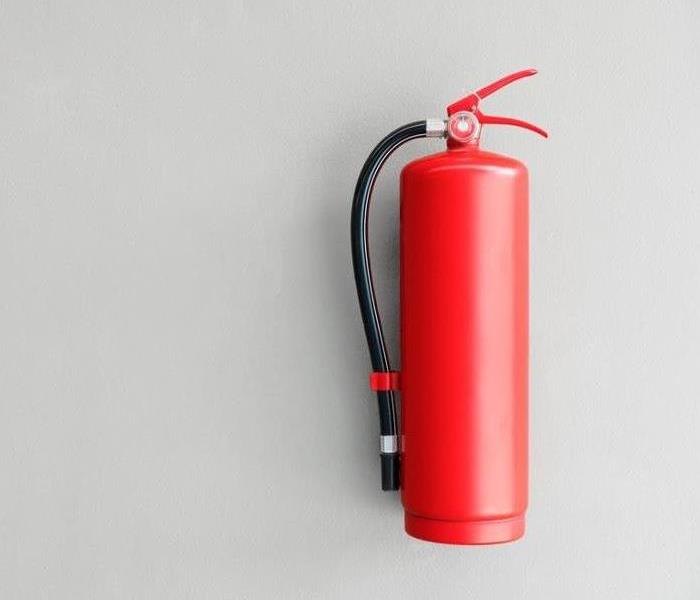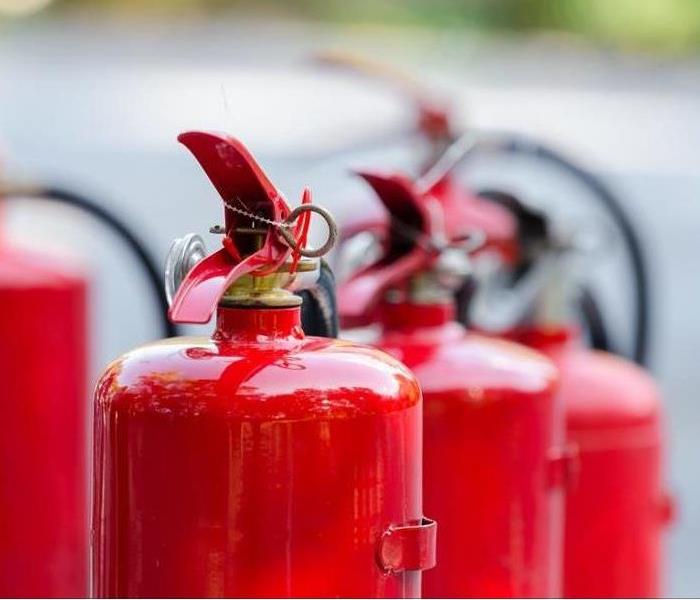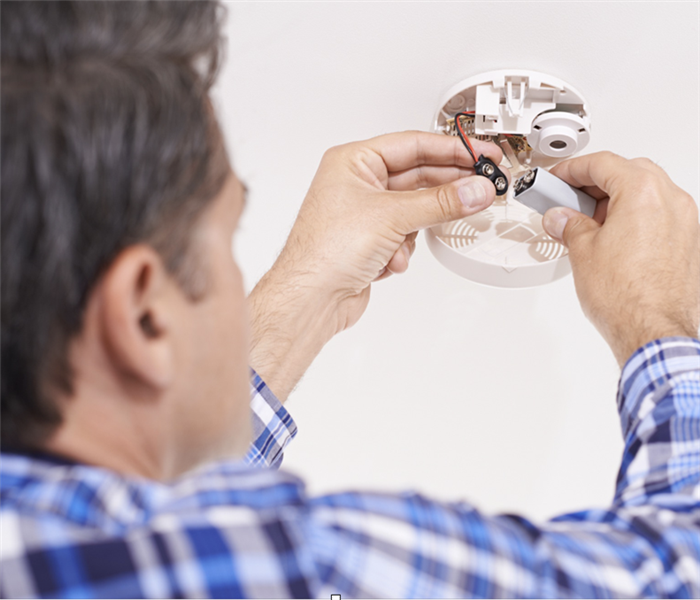Archived Fire Damage Blog Posts
Cozy Winter Vibes and Fire Prevention | SERVPRO® of West Beaver County
1/9/2024 (Permalink)
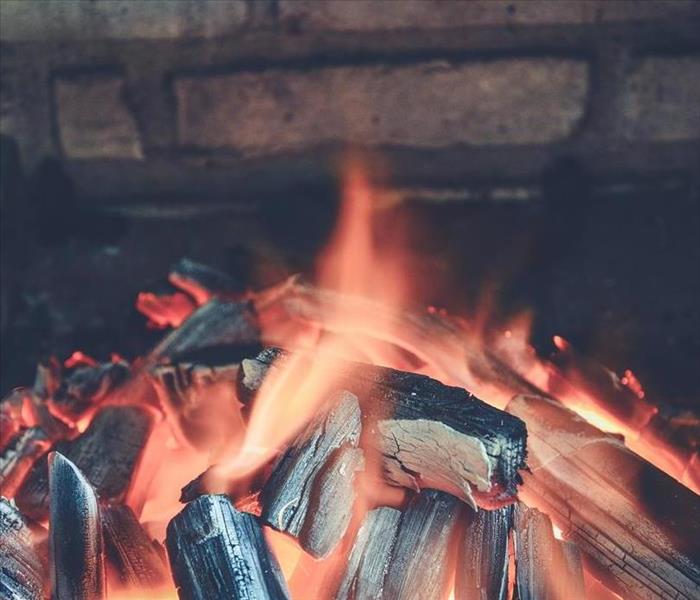 Fireplace vibes
Fireplace vibes
Few things beat the cozy ambiance of a crackling fireplace during chilly evenings, but as the saying goes, "With great warmth comes great responsibility." While fireplaces add charm to our homes, they also pose potential hazards if not handled with care. In this blog post, we'll explore common mishaps associated with fireplaces and provide essential tips on preventing them.
Common Fireplace Mishaps:
Creosote Buildup:
- Issue: Creosote, a byproduct of burning wood, can accumulate in your chimney, leading to chimney fires.
- Prevention: Schedule regular chimney inspections and cleanings by a professional to remove creosote buildup and ensure proper ventilation.
Cracked Chimney Liner:
- Issue: Over time, the chimney liner can develop cracks, allowing heat and embers to reach combustible materials in your home's structure.
- Prevention: Regularly inspect the chimney liner for cracks and invest in professional repairs or replacements as needed.
Sparks and Embers:
- Issue: Sparks and embers escaping the fireplace can ignite nearby flammable materials.
- Prevention: Use a fireplace screen or glass doors to contain sparks. Keep flammable items at a safe distance and never leave the fire unattended.
Improperly Seasoned Wood:
- Issue: Burning green or wet wood can lead to excessive creosote buildup and inefficient combustion.
- Prevention: Only use well-seasoned, dry wood in your fireplace. Store wood in a dry place to ensure it's ready for use.
Neglected Maintenance:
- Issue: Lack of regular maintenance can lead to various issues, including blockages and deteriorating components.
- Prevention: Schedule annual professional inspections and address any identified issues promptly.
Essential Fireplace Safety Tips:
Regular Inspections and Cleanings:
- Schedule annual inspections and cleanings by a certified chimney sweep to ensure safe and efficient fireplace operation.
Proper Disposal of Ashes:
- Allow ashes to cool completely before disposing of them in a metal container, away from flammable materials.
Maintain a Clear Zone:
- Keep a three-foot clear zone around the fireplace, free from flammable objects such as curtains, furniture, or décor.
Install Smoke and Carbon Monoxide Detectors:
- Ensure your home is equipped with working smoke and carbon monoxide detectors, and test them regularly.
Educate Family Members:
- Teach family members about the importance of fireplace safety, including the proper way to build and extinguish fires.
By taking proactive measures and staying vigilant, you can enjoy the warmth and ambiance of your fireplace while minimizing the risk of mishaps. Prioritize regular maintenance, and your fireplace will continue to be a source of comfort and joy for years to come. If you ever experience a fire-related mishap, SERVPRO® Beaver County is here to provide swift and professional restoration services. Stay warm and stay safe!
How to Keep Your Holiday Decorating Fire-Safe | SERVPRO® of Beaver County
11/8/2022 (Permalink)
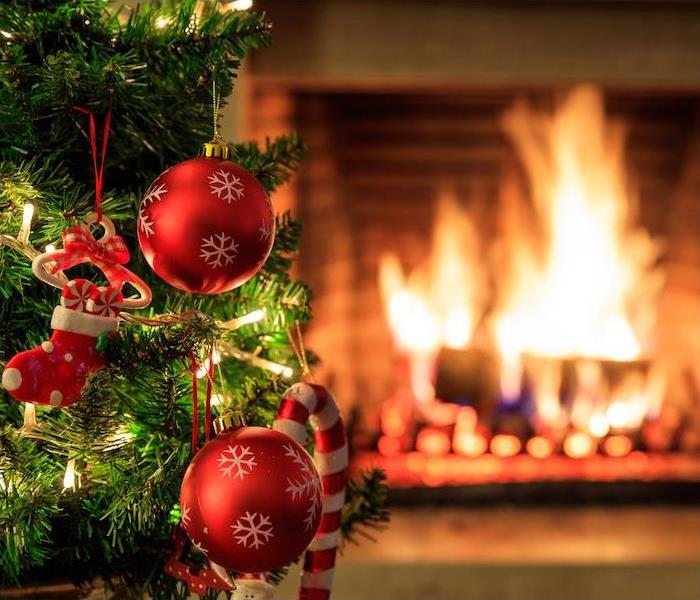 Should a fire issue pop-up during this holiday season, SERVPRO of Beaver County will be on call ready to assist.
Should a fire issue pop-up during this holiday season, SERVPRO of Beaver County will be on call ready to assist.
The thought of the holidays is wonderful: shining lights in every room and the mouth-watering smell of freshly-baked cookies and sweets. This season is almost unbeatable, but it also brings the year’s highest risk of home fires.
In Pennsylvania, we know how snowstorms can turn our town into a winter wonderland overnight, but we also know how to have a good time during it! There are numerous activities taking place over the next few months, like the famous Murder On The Orient Express train ride.
These events can create a wonderful holiday experience, but you should take preventive measures to protect your home before you leave it alone this winter. Taking the proper precautions can keep you and your home safe while experiencing the wonder of the holidays.
Top Seasonal HazardsUnited States fire departments respond to approximately 790 structural fires a year that began due to holiday decorations.
Placing these items too close to heating sources is a major cause of the fires. Additionally, Christmas trees and candles make the list of other home fire sources.
A real tree requires lots of care, with constant watering and sweeping to prevent dead needles from piling up. Artificial trees must be certified as fire-resistant to be safe, but it’s also crucial to avoid overloading your outlets when decorating any kind of tree.
Take Preventive Measures“The stocking were hung by the chimney with care” should be more than a quick line read on family night. Remember this quote when decorating your home so that you never place an item too close to an open flame.
Candles cause approximately 20 house fires a day, so double-check that yours are not too close to other flammable items. If your home has a fireplace, it’s also important to have it inspected annually to prevent disaster.
Check that your outdoor decorations are rated for this kind of use, and hang them properly to avoid falling lights that may cause a fire outside. Check our local government’s website for any regulations on outdoor decorating so that you can follow the guidelines.
Routinely inspect your smoke detectors and install one in each bedroom and on each floor of the home. Create and practice a fire emergency plan with your household, and add SERVPRO of Beaver County to your contacts so that you can reach us fast if a fire sparks up inside.
Have smoke or fire damage in your house? Contact us today to get cleaned up fast.
How to Stop Floodwater From Invading Your Property | SERVPRO® of Beaver County
9/7/2022 (Permalink)
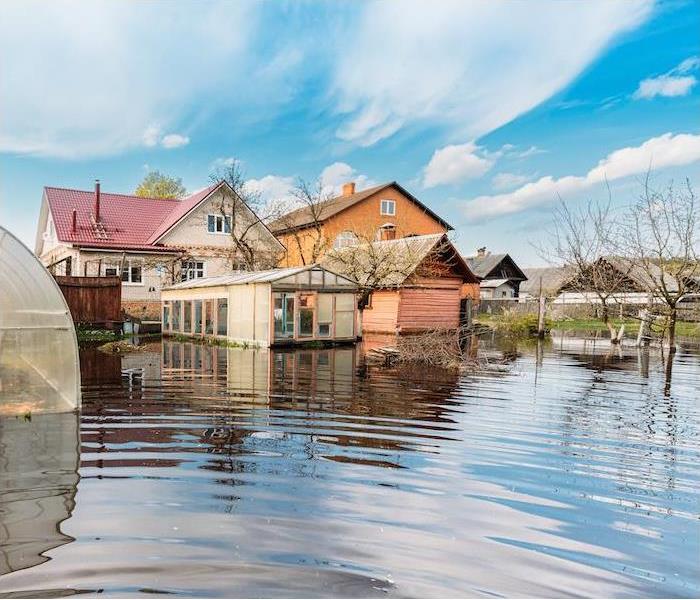 Experienced water damage in your home? Call SERVPRO of Beaver County to get the restoration process started right away.
Experienced water damage in your home? Call SERVPRO of Beaver County to get the restoration process started right away.
It’s crucial for everyone to prepare for flooding, regardless of where you live. Even areas that don’t see this disaster regularly can be surprised because it takes less than an inch of water to begin ruining your possessions.
You can take steps both inside and out of your home to shield against flooding, but first, you must understand the regional risks we face. Here in Beaver County, we know the hardships of water damage. The rivers and creeks that dissect our region often overflow when presented with heavy rain. This means that we face a higher likelihood of floods than most other regions, so it’s even more crucial to be prepared.
Once you know about the risks we face in our area, you can begin to prepare for them with the following steps:
<h3your-home-from-the-outside">Protecting Your Home From the Outside
Heavy rainfall can come from nowhere and cause an overflow of water to collect around your property. However, there are steps you can take to be prepared, like keeping your gutters clear and operating correctly.
You can also utilize landscaping techniques that direct water away from your home’s structure. Less expensive versions of this include rain gardens, which are a mix of various bushes, plants and small trees with root structures that can absorb high amounts of rainfall.
It may seem like a lot of work initially, but when considering the potential costs for restoration and the stress of recovering, taking these actions is a great choice. Not only will they give your home added protection, but these ideas can also improve the look of your land.
<h3protection-from-the-inside">Flood Protection From the Inside
Protecting your home from external flooding begins with the foundation of your structure. You should regularly check for any cracks and seal them immediately, and think about installing a sump pump if your basement or crawl space regularly floods.
To keep your home safe from internal flooding like failed plumbing and leaky faucets, routine maintenance is the best solution. Identify any leaks in your pipes, and repair or replace them before a major problem arises.
It’s important to prepare ahead of time because floodwater is a powerful force regardless of where it comes from. Keep any photographs or valuable documents in elevated positions inside waterproof containers, and practice an emergency plan with your family so that you’re ready for the next potential flood.
Experienced water damage in your home? Call SERVPRO today to get your restoration completed faster.
How to Keep Your Backyard Fire Safe & Contained | SERVPRO® of Beaver County
7/21/2022 (Permalink)
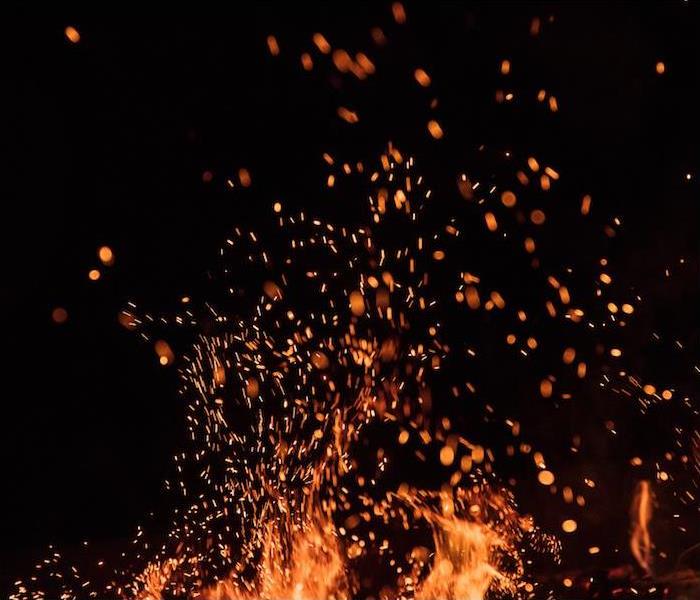 If you have experienced fire or smoke damage, contact SERVPRO of Beaver County.
If you have experienced fire or smoke damage, contact SERVPRO of Beaver County.
A backyard fire is one of the great enjoyments of being a homeowner. Sitting around the flames while telling stories and eating good food is just one of the ways you can use it.
Many people use fires for cooking meals, keeping bugs away and obviously as a way of burning excess debris. However, these fires that seem harmless are actually a great danger to the surrounding region.
The National Park Service reports that humans are responsible for nearly 85% of wildfires.
In Pennsylvania, we see a high risk of wildfires, due to the high heat in the warmer months combined with our thick areas of forests and foliage. This means that we need to be extra cautious when lighting fires outdoors, otherwise we could start the next outdoor disaster.
This reality doesn’t mean that we can’t enjoy a fire at home or that we shouldn’t burn dead leaves. It tells us that we all should take the proper safety measures and never take additional risks when attempting to have a controlled fire on our own property.
Recreational Fire HazardsAs we mentioned previously, every kind of fire comes with risks, but fireworks and campfires are two of the leading causes of wildfires. On average, grills start 8,800 home fires each year, typically caused by improper use. It’s important to check the propane or coals before leaving the grill unattended after use.
When constructing a campfire it’s important to pick a spot with ample space around it so that nothing else catches on fire. Ensure at least a 30-foot buffer between any structure or vehicle, and only use wood to keep the fire going so that you can reduce the risk of a spread.
Additionally, if you have a backyard fire pit, it’s important to treat this equipment with the same caution as any other fire. This includes keeping it away from any overhangs and only placing it on rocks or dirt.
Many people choose to get rid of their household or construction waste with fire, but you should never do this—only burn approved firewood to reduce your personal risk.
Fireworks are legal in Pennsylvania, but this doesn’t mean you should carelessly launch these dangerous explosives. Make sure that your fireworks are only being launched on your own private property, and watch where the debris falls so that you can reduce the risk of an outdoor fire.
Other Outdoor Fire HazardsAlthough fires can be risky, they can still be useful in our area. We see a lot of falling leaves during the fall, and this can significantly increase the chance of wildfires when the buildup becomes too much.
Because of this, burning your debris might be the most effective way to keep your property clean and safe from fires.
Our local government has some complex ordinances set up to prevent wildfires from occurring, which can make it difficult to legally burn your debris. Here is a page from the Beaver County Fire Department that can help you perform an outdoor burn without breaking the law or putting our region at risk.
Along with clearing dead debris from your property, landscaping your yard to stop the spread of flames can greatly reduce the chance of suffering wildfire damage near your home. Most importantly, knowing what to burn and adhering to the safety guidelines can help you stay safe with fires.
Many people keep their extra gasoline or oil stored in the garage or shed. However, this can actually put your home at a greater risk of suffering a fire. Make sure that you only store these dangerous materials in proper containers with safety locks that guard against leakage or curious children and animals.
It’s a smart idea to check your weather updates for any reason not to have a fire. High winds and dry conditions mean that your fire has a greater chance of spreading beyond your control, and you should think about postponing it.
If you do experience fire damage, call SERVPRO of Beaver County right away. We have 24⁄7 availability with a quick response to any kind of disaster. We always attempt to restore as much of your home as possible as soon as we possibly can.
Burn safely outdoors. And save some chocolate for us! If you have experienced fire or smoke damage, contact us today to get restoration started faster.
Simple Steps That Can Reduce Your Risk of Suffering A House Fire | SERVPRO® of Beaver County
6/6/2022 (Permalink)
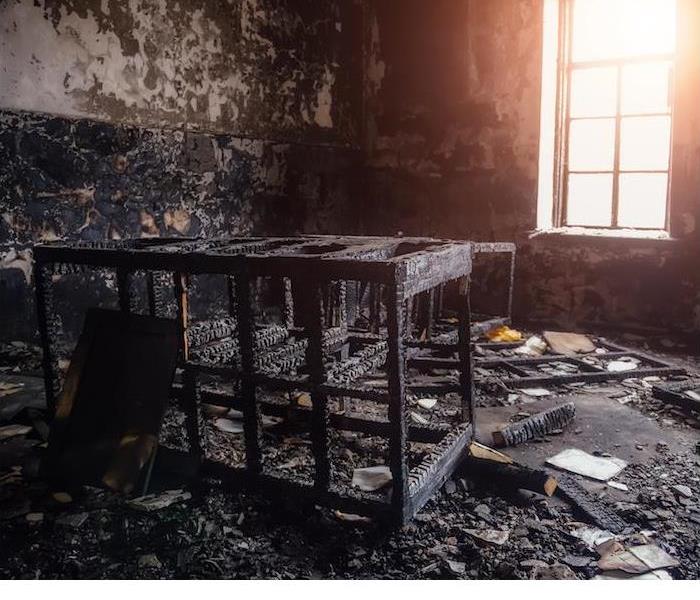 If your home is damaged in a house fire, SERVPRO of Beaver County is here to help. Contact us for any fire restoration need.
If your home is damaged in a house fire, SERVPRO of Beaver County is here to help. Contact us for any fire restoration need.
We have all seen the news over the past few years detailing how wildfires are becoming more common and more serious—well, so are house fires. So far in 2022, the American Red Cross has responded to over 20,000 house fires, which is only a small fraction of the total fires in the United States this year.
Most modern homes already have complete coverage from smoke detectors and carbon monoxide alarms, but make sure that you have a smoke alarm in every bedroom and at least one CO alarm in the home.
These devices are proven to be the best way to stop complete destruction or a loss of life due to a fire. While smoke detectors are a must-have, there are many simple things you can do around the house to reduce your risk of a house fire.
<h3the-kitchen-grill">Clean the Kitchen & Grill
Over 48% of all home fires on average are started while cooking food. There are many common appliances that are designed to produce heat, and some of them are without safety mechanisms. You likely have a toaster, oven, stove, microwave, grill and a coffee maker in your home, and all of these can put you at risk when improperly used.
Cleaning these items regularly and removing any pieces of food that could ignite is important to keep your home free of hazards. Additionally, you should never grill under a covered area like a roof or deck, these things can easily catch fire when heat builds up from below.
Dirty wall outlets are another common source of fire in the home. Check these regularly for a collection of dust or dirt that could cause sparks to fly. Also, remember to leave plenty of space between your devices and the wall to allow proper airflow.
<h3a-defensible-space-in-your-yard">Create a Defensible Space in Your Yard
Fires that begin outside can spread by over 14 miles per hour. When they come knocking at your door, a yard is the last thing standing between your home and destruction.
Recently, there have been innovative landscaping methods that protect your home from the spread of outdoor fires, and allow firemen to work with plenty of space while trying to work.
These techniques have been so useful in fact, that states like California are imposing defensible zone requirements for yards, so following suit might also be a smart idea for you.
However, following these techniques doesn’t prevent you from tending to the garden and planting new flowers in your beds—they focus on placing plants in specific locations to prevent the fire from expanding.
The fire will weaken with the flammable objects spread further apart, so you should take the time and clear out any dead plants or leaves that could become fuel during a fire.
<h3it-clean-keep-it-safe">Keep It Clean & Keep It Safe
Aside from cleaning your appliances regularly, and maintaining your yard, performing a thorough cleaning routine can help reduce your risk of house fires. Set aside time for you and your family to work through the long list of necessary tasks.
The seemingly endless sheet of cleaning jobs doesn’t have to be burdensome if you spread it out over the course of a week. Along with a deep-clean, simply dusting your home from time to time is a way to prevent fires.
These days, our homes have evolved into more than simply shelter. They allow us to work, play and relax every single day. Putting in the effort to keep yours clean is a relatively easy way to help prevent destruction from a fire.
If you have experienced fire damage or want to learn more about our fire damage restoration services, contact us today. We’re here to act fast, 24⁄7.
Creating a Smart Fire Evacuation Plan for Your Business | SERVPRO® of Beaver County
1/16/2022 (Permalink)
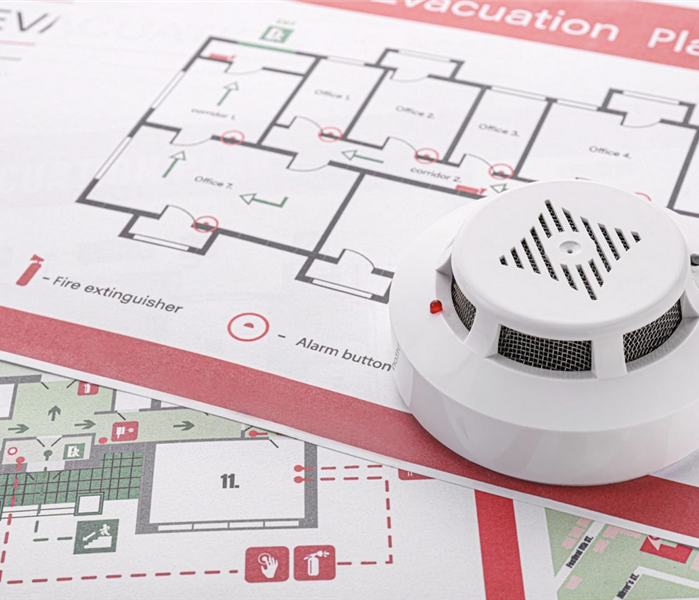 Having a plan in case of a fire requires little investment but can save lives
Having a plan in case of a fire requires little investment but can save lives
While there are so many things that are important for a business owner to consider, in everything that you do, the safety of yourself and your staff is of the utmost importance in your daily operations. No one wants to consider the possibility that a workplace emergency might impact them, but they can happen with little warning.
That is why having a plan is one of the best things you can do in the event of an emergency such as a fire.
Thankfully, planning your business’ fire evacuation plan does not take much time or any money, and it is a great step to keep everyone safe in the event of the unthinkable. Read on for some key considerations that business owners should keep in mind.
### Tips for Creating Your Business’ Fire Evacuation Plan
**Consider the possible fire scenarios.** Fires can break out in a multitude of ways, but some areas are more prone to fires than others. Kitchens are the top culprits for workplace fires, whether they are office kitchens or commercial ones. Additionally, any areas with a lot of electronics, such as a bay of desks, can be a threat. Think through the places where a fire may break out so you can plan your evacuation routes accordingly.
**Identify your exits.** Every area of the office should have at least two exits so that people can safely get out regardless of where the fire originates. Identify what exits your staff has access to, and be sure they are clearly marked as emergency routes so everyone knows exactly where to go to get to safety. If your office does not have an adequate number of exits, it is wise to consult your local fire marshal to see about getting an emergency ladder or some other solution.
**Practice with your staff.** Most people have a hard time thinking rationally in an emergency scenario, and an office fire is no different. Practice your evacuation procedures with your staff option so they can memorize the protocols well. This can keep things much calmer if a fire were to break out, as everyone is confident in what they should do and should not feel the need to panic.
*If you need assistance after a workplace fire, you can count on us for restoration help. Get in touch today to learn about our commercial fire restoration services.*
Understanding When and How to Use a Fire Extinguisher | SERVPRO® of Beaver County
1/16/2022 (Permalink)
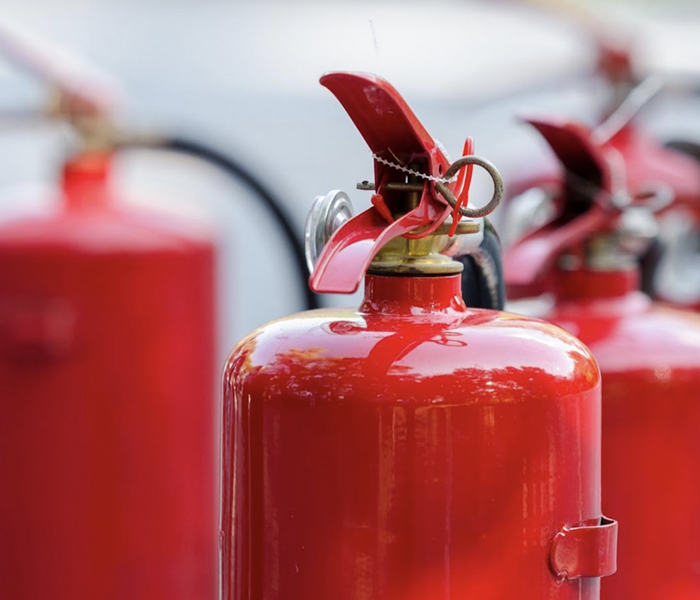 Knowing how to properly use a fire extinguisher can help to avoid a large fire. SERVPRO can help restore any smoke damage from fires that do occur.
Knowing how to properly use a fire extinguisher can help to avoid a large fire. SERVPRO can help restore any smoke damage from fires that do occur.
If you are trying to increase the fire safety efforts in your household, purchasing fire extinguishers for any high-risk rooms is a great place to start. Fire extinguishers are an inexpensive way to take the right steps toward fire prevention, and by having them at the ready, you are reducing the chances that a small flame will turn into a major house fire.
While buying a fire extinguisher is a great first step, knowing when and how to use it is every bit as important. Using a fire extinguisher should only be done if it is safe to do so, and memorizing how to use it is key for being able to take the proper actions in the moment.
### When to Use a Fire Extinguisher
While you may think the answer is obviously, “in the event of a fire,” deciding when to use a fire extinguisher safely is actually a lot more nuanced. While putting out the fire is important, it is more important that you are keeping yourself and any others who may be present out of harm’s way.
Here are a few questions for deciding when to use a fire extinguisher:
- Is the fire contained and only impacting a small area?
- Have I alerted others that a fire has started?
- Do I know how to properly use the fire extinguisher?
- Is someone in the process of calling the fire department?
- Do I have enough fresh air, or is there toxic smoke from the fire?
- If I cannot extinguish the fire, do I have an escape route?
If you are able to answer “yes” to all of these questions, then it should be safe to proceed to using the fire extinguisher. However, if you are not, it is best to simply escape and call the fire department so they can handle the flames.
### How to Use a Fire Extinguisher
If you need to use a fire extinguisher, remember the P.A.S.S. method:
- Pull the pin at the top.
- Aim the extinguisher at the base of the fire, not at the flames.
- Squeeze the handle to release the contents.
- Sweep the extinguisher from side to side until all flames are gone.
*If you have damage due to a fire in your home, you can count on us for restoration. You can call us 24/7 to report damage or to hear more about our services. Contact us today!*
Should You Trust Us to Handle Your Fire Damage Restoration? | SERVPRO® of Beaver County
1/11/2022 (Permalink)
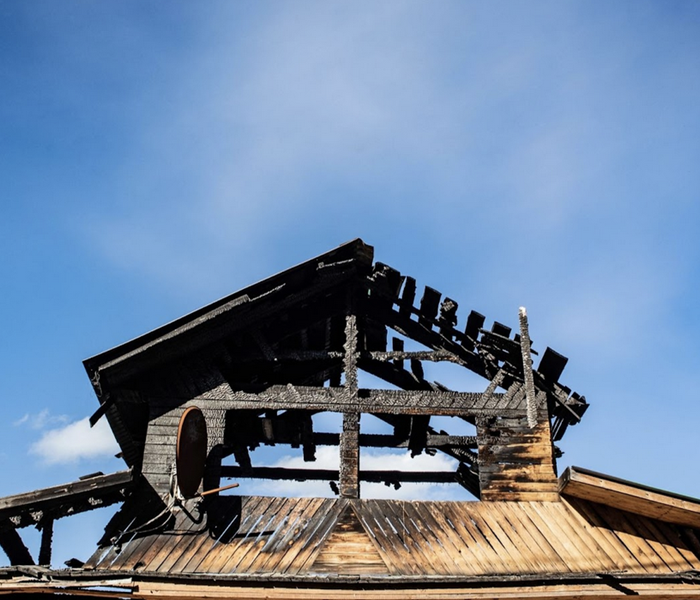 We will handle even the toughest smoke and soot cleanup
We will handle even the toughest smoke and soot cleanup
Experiencing a house fire is an extremely traumatic experience that is full of charged emotions. Not only do you experience being fearful for your and your family members’ lives, but you also have to deal with the damage to your property and personal belongings that a fire can cause—all while orchestrating the restoration and trying to return to a sense of normalcy in life.
It is safe to say that experiencing a house fire is a rough event, but having the right restoration team on your side can make a major difference in the recovery process. If you are unsure who you should trust for fire restoration should you ever need it for your home, read on to learn a bit more about what makes us different.
### Why We Are the Best Choice for Fire Restoration
**We can handle all aspects of fire restoration.** If you have a fire in your home and have never experienced one before, you are likely to be surprised by how far-reaching the damage can extend. Not only can smoke and soot pervade far away areas of the home, but water damage from extinguishing the flames can also be extensive. Fortunately, we can handle every aspect of this, ensuring that all odors are removed and that all moisture is properly dried to prevent mold and mildew from taking hold.
**We will handle smoke and soot cleanup.** Smoke and soot are extremely pervasive side effects of having a fire in your home. Smoke odors are persistent and can soak into fabrics and belongings, while soot is made up of harmful substances and can coat everything in a thick film. We have the expertise and the equipment to get rid of smoke odors and soot, so you can rest easy knowing that your home is healthy for your family to inhabit once more.
**We understand the recovery process.** Recovering from a house fire is about a lot more than just having your belongings restored, and we completely understand that. A house fire is a traumatic event for you and everyone in your family, which is why we will work diligently with you to help you regain a sense of normalcy as quickly as possible after a fire.
*If your home is damaged in a house fire, we are the team to call for restoration. Get in touch with us 24/7 to learn more about how we can help you recover.*
Creating a Smart Fire Evacuation Plan for Your Business | SERVPRO® of Beaver County
1/11/2022 (Permalink)
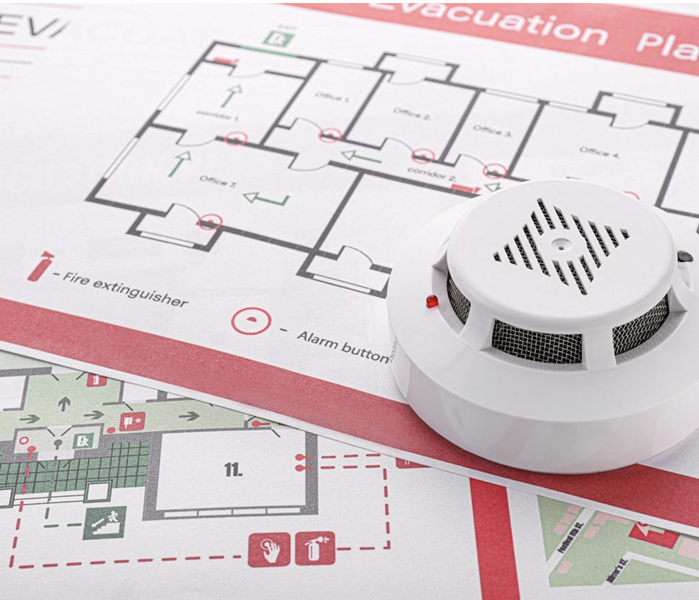 Having an evacuation plan is not costly and can save lives
Having an evacuation plan is not costly and can save lives
While there are so many things that are important for a business owner to consider, in everything that you do, the safety of yourself and your staff is of the utmost importance in your daily operations. No one wants to consider the possibility that a workplace emergency might impact them, but they can happen with little warning.
That is why having a plan is one of the best things you can do in the event of an emergency such as a fire.
Thankfully, planning your business’ fire evacuation plan does not take much time or any money, and it is a great step to keep everyone safe in the event of the unthinkable. Read on for some key considerations that business owners should keep in mind.
### Tips for Creating Your Business’ Fire Evacuation Plan
**Consider the possible fire scenarios.** Fires can break out in a multitude of ways, but some areas are more prone to fires than others. Kitchens are the top culprits for workplace fires, whether they are office kitchens or commercial ones. Additionally, any areas with a lot of electronics, such as a bay of desks, can be a threat. Think through the places where a fire may break out so you can plan your evacuation routes accordingly.
**Identify your exits.** Every area of the office should have at least two exits so that people can safely get out regardless of where the fire originates. Identify what exits your staff has access to, and be sure they are clearly marked as emergency routes so everyone knows exactly where to go to get to safety. If your office does not have an adequate number of exits, it is wise to consult your local fire marshal to see about getting an emergency ladder or some other solution.
**Practice with your staff.** Most people have a hard time thinking rationally in an emergency scenario, and an office fire is no different. Practice your evacuation procedures with your staff option so they can memorize the protocols well. This can keep things much calmer if a fire were to break out, as everyone is confident in what they should do and should not feel the need to panic.
*If you need assistance after a workplace fire, you can count on us for restoration help. Get in touch today to learn about our commercial fire restoration services.*
Brush Up on Fire Safety for the Warmer Months | SERVPRO® of Beaver County
12/14/2021 (Permalink)
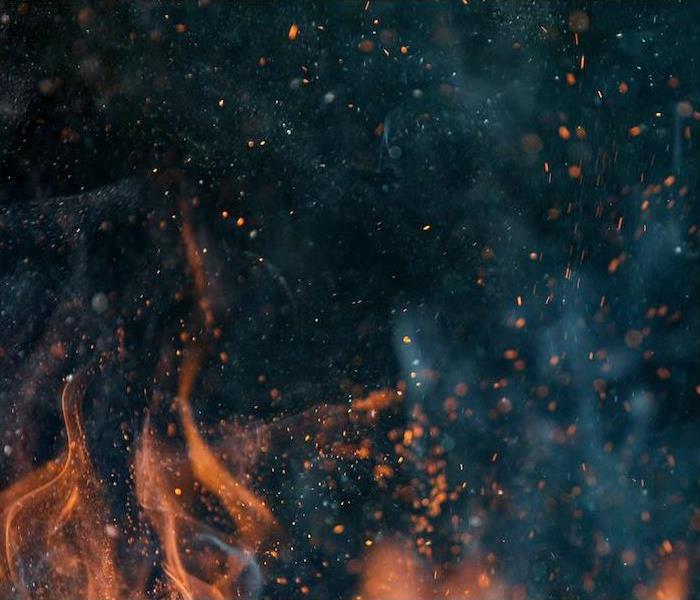 Restoring fire and smoke damage is one of our specialties. Contact SERVPRO of Beaver County to learn more.
Restoring fire and smoke damage is one of our specialties. Contact SERVPRO of Beaver County to learn more.
The warmer months will be here before you know it! This means longer days, new life and so many activities outdoors.
Warmer months offer us cookouts, bonfires, roasting marshmallows and so much more. But when doing these fun things, who focuses on safety?
Let’s look ahead and see what we can do in order to be proactive.
It’s proven that spring sees more daily fires on average than any other time of the year.
With safety being brought to the forefront, let’s focus on some of the most common fire risks and how you can prevent them.
Grilling
Barbecuing, cookouts…all fun, but also can be quite risky! With a combination of flame, heat, grease and gas, grilling can lead to danger easily. Before grilling, do a quick little inspection to make sure it’s in good working order with no leaks, placed at least three feet away from anything flammable and that it is cleaned in between uses. While cleaning in between uses seems like common sense, 20% of grill fires are caused by improper cleaning.
Fire Pits
Fire pits are where many people have the best discussions! You can become so enthralled with conversations that you might let safety slip your mind. Never leave kids unattended around a fire pit, and always keep a bucket of water close to the pit. Think ahead and don’t add leaves or pine needles to the fire. And when you’re ready to put it out, do it slowly to keep from scattering embers.
Chimneys & Dryer Vents
You’re much less likely to be using your fireplace during the summer, so now’s a good time to have it inspected and cleaned. A buildup of ashes can cause serious damage. Your dryer vents can also become clogged, so take the time to clean the pipes. As a bonus, taking care of these items now helps you become prepared for the winter months.
Your local SERVPRO technicians are on hand 24⁄7 for emergencies. If you encounter fire damage at your home or business, no matter the cause, we will be there faster and have it cleaned up sooner. Call or click today and experience the SERVPRO difference.
Fall Into Fire Safety | SERVPRO® of Beaver County
12/14/2021 (Permalink)
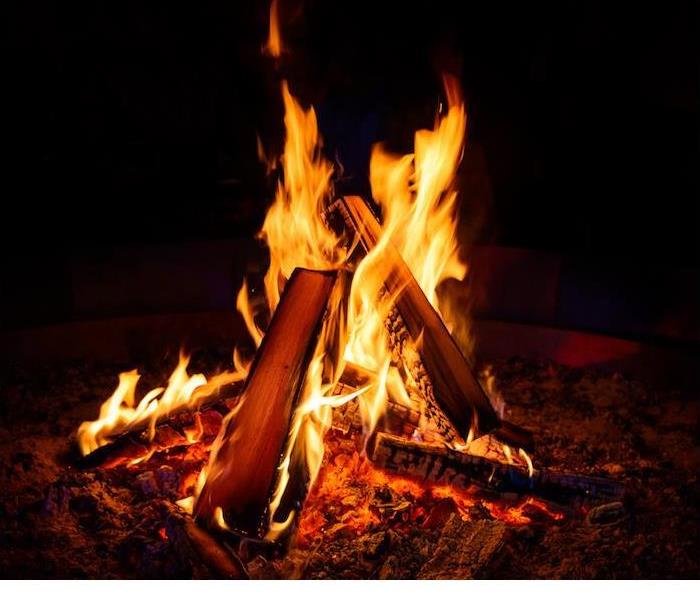 Be mindful about fall fire safety. Always remember that SERVPRO of Beaver County is the trusted leader in the restoration industry.
Be mindful about fall fire safety. Always remember that SERVPRO of Beaver County is the trusted leader in the restoration industry.
As you step outside in the mornings or evenings, you are probably starting to notice that crisp fall air making its way into full swing.
Fall can be a fantastic time to enjoy the great outdoors, but like any other season, fall does bring about some safety issues that we want to bring to your attention.
So tonight as you sit on your porch and enjoy the crisp breeze, take a look at these safety precautions you can use.
Campfire Safety
Campfires are a staple when it comes to fall weather. But do you know the safety precautions to take before really enjoying the campfire? Here’s a quick review.
As you prepare to build your campfire, the first step is to ensure that you build it somewhere away from anything flammable and away from low limbs of trees. Only use dry twigs or leaves to help get the fire started, and once it’s finally “caught,” you can add bigger sticks or limbs.
Never use an accelerant like kerosene or lighter fluid.; stick with a lighter or match instead, since accelerants can quickly make a fire spark beyond control.
When you are ready to put your fire out, slowly pour water on the fire. By pouring water on the embers, you reduce the risk of the fire reigniting.
Space Heaters
Portable space heaters are known to be one of the most common causes of home fires in the fall and winter. Anytime you use one of these, make sure you stay aware and never leave it unattended.
Most space heaters now have technology in place where if the heater gets tipped over or becomes too hot, the device will automatically shut off. But you still can’t be too safe when using these. Make sure you keep your heater up and away from anything flammable and from anyone who could accidentally knock it over.
Halloween
While Halloween seems far away, it can creep up on you in no time. You should know that candles, decorations and even costumes can be potential fire hazards.
So as you decorate and prepare to celebrate, stay aware and be attentive.
If a fire hazard should turn from potential to reality in your home, remember the trusted leader in the recovery industry and contact SERVPRO to get your property fully restored right down to the smell of smoke.
Take a Stand Against House Fires | SERVPRO® of Beaver County
12/14/2021 (Permalink)
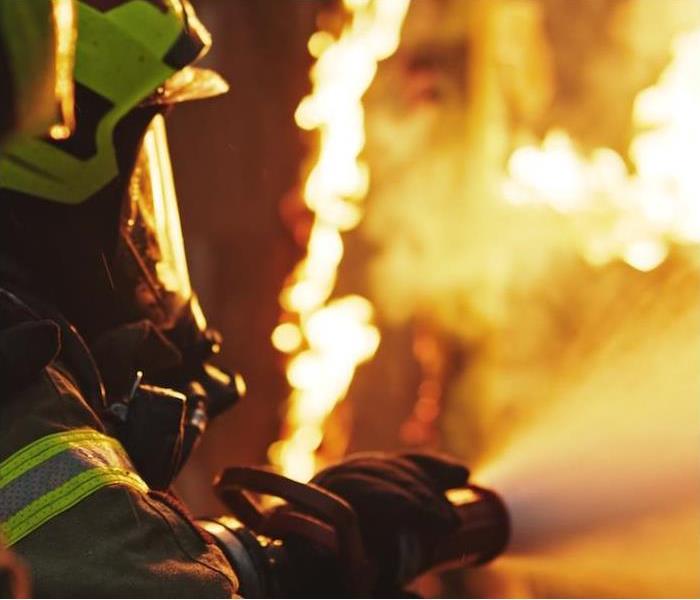 Regardless of the cause, SERVPRO of Beaver County are here for you if your home is affected by fire.
Regardless of the cause, SERVPRO of Beaver County are here for you if your home is affected by fire.
Seeing your home on fire is a frightening scenario to imagine. Fire is something that can happen out of nowhere and cause mass destruction in a matter of minutes.
And despite the amount of awareness that is brought to light about fire safety, more than a quarter of all reported fires occur in homes.
Let’s look at the top causes of house fires, and see if we can help get that number down by learning what we can do to help prevent them.
Cooking. Most house fires start in the kitchen, and the No. 1 culprit is unattended cooking. All you have to do to keep this from happening is to stay at the stove, oven or grill while you prepare food.
Heating equipment. House fires are more common during the winter, for good reason. Around 14% of house fires emanate from the heating unit. Many factors can contribute to this, including malfunctions, mishaps and flammables being too close. One common culprit? The space heater. If you use these handy heaters, place them away from anything flammable and on a level surface.
Electrical fires. There are lots of ways electrical fires can begin, but the most common is frayed wires or faulty outlets! It’s important to ensure you’re using electrical devices appropriately, and if you have an older house, have the electrical system inspected regularly. Older homes weren’t built with modern electrical usage in mind.
Intentional fires. There are more than 28,000 intentional home fires started every year. These aren’t fires that are set for other reasons and simply get out of control; these are fires that are set with the intention of destruction.
Smoking materials. Cigarettes and other smoking materials are responsible for only 5% of all house fires, but they are the cause of the most fire deaths. These deaths typically occur when someone falls asleep while smoking.
Regardless of the cause, SERVPRO is here for you if your home is affected by fire. Contact your local team today to see how we can help.
The Facts About Defensible Space | SERVPRO® of Beaver County
12/14/2021 (Permalink)
 If your home is damaged by fire or any other reason, SERVPRO of Beaver County is ready and able to repair any damage.
If your home is damaged by fire or any other reason, SERVPRO of Beaver County is ready and able to repair any damage.
Wildfires happen more than most people think, and they often cause property damage. These potent fires can progress quickly because of the combustible materials our world is made up of.
It’s important to take steps to lower the risk of wildfires and protect your home and property. The first key step is to simply be more careful.
But implementing a defensible space around your property is another way you can limit your risk.
Fire Control Using Defensible Space
“Defensible space” is a natural landscaped area that is maintained to reduce fire danger by creating a buffer.
Wildfires spread when they come across items that serve as fuel, such as downed tree branches and dead leaves. That is why it’s important to use responsible planting and pruning practices and to implement landscaping elements such as flame-resistant gravel.
Defensible space creates an invisible barrier of protection, designed to protect your home from wildfires. By creating this barrier, you help slow or stop the spread of fire as it draws nearer. This also gives firefighters their best chance of stopping a wildfire before it reaches your home.
Because defensible space is such an effective means of fire prevention, it’s recommended or even mandated in many cities, counties and states.
Wildfires Gone Wild
When you think about wildfires, the West Coast may come to mind. But in reality, wildfires can happy anywhere. There were over 59,000 wildfires across the United States in 2020.
And while California did account for 10,000+ of that number, the average number of wildfires per state in 2020 was right under 1,000. Here in Pennsylvania, we had 1,488 wildfires last year, burning 2,997 acres of land.
Because wildfires are becoming more common, it is essential that we do everything we can to help prevent them. Defensible space is one way that we can do our part.
If your home is damaged by fire of any sort, wild or not, SERVPRO is ready and able to repair the damage caused. Get in touch today to get the pros on your team.
Important Things to Note About Your Home’s Smoke Alarms | SERVPRO® of Beaver County
12/14/2021 (Permalink)
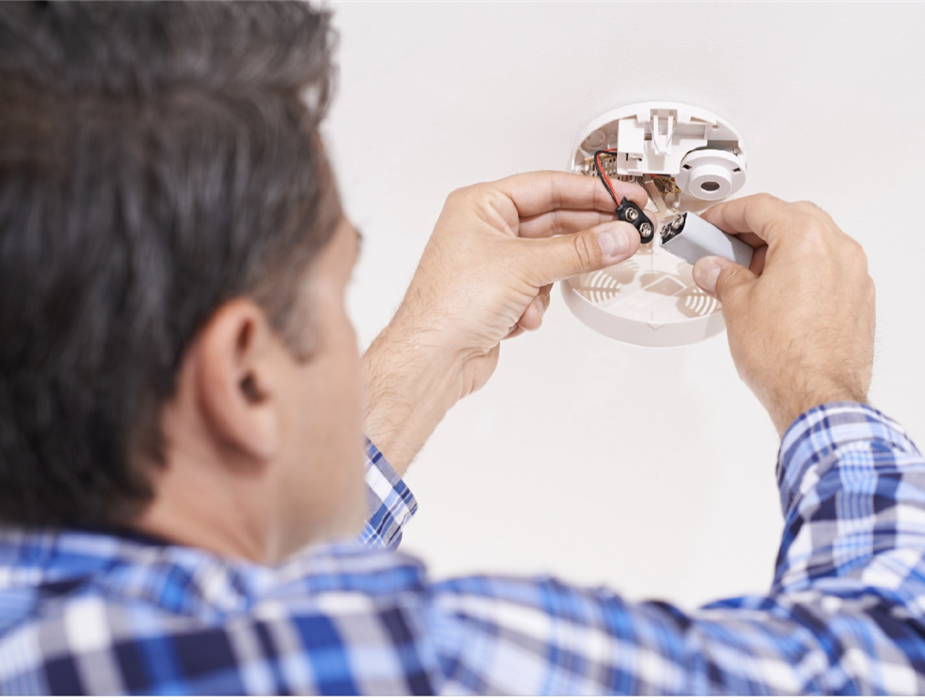 Smoke detector maintenance is crucial to home fire safety
Smoke detector maintenance is crucial to home fire safety
Smoke detectors are an absolutely essential safety feature of any home or outbuilding—the
phrase, “smoke detectors save lives,” is one that certainly rings true. However, smoke detectors
are not something you can set up and forget until you need them.
Properly maintaining and testing your home’s smoke alarms is an important part of ensuring
they will work in the event of an emergency.
Fortunately, proper smoke detector maintenance does not take much time and can be easily
added to your seasonal home maintenance task list with ease. Just a few minutes every month
can provide you with priceless peace of mind and keep you and your family safer in the event of
a fire.
### How to Maintain Your Smoke Alarms
**Check them every single month.** In a quarter of household fires where smoke detectors
failed, dead batteries were to blame—which is a very preventable tragedy. Every 30 days, be
sure to use the test button on each smoke detector in your home to ensure that it is working as
it should, and if yours are equipped to notify you about a low battery, be sure you change them
out promptly.
**Replace them every 10 years.** Even if your smoke alarms seem to be working during your
monthly tests, they should still be replaced every 10 years according to the National Fire
Protection Association. Because their internal components can wear down with time, they can
become less effective at detecting smoke in the home and may not notify your family with
enough time to spare.
**Be sure you have plenty of them.** Do an assessment of how many smoke alarms you have
in your home and where they are located to see if you need more. You should have smoke
alarms inside every bedroom, outside each sleeping area, on every level of the home and in the
kitchen, garage and basement.
**Have a plan in case they sound.** If a smoke alarm sounds, it is vital that you and your family
know what to do. Making sure you have a proper evacuation plan in place is key to getting
everyone out quickly so you can stay safe and await the fire department’s response.
*If you have household fire damage, you can count on us to help. Get in touch today to learn
more about our fire restoration services and how we can help.*
Household Fire Hazards You May Not Be Aware Of | SERVPRO® of Beaver County
12/14/2021 (Permalink)
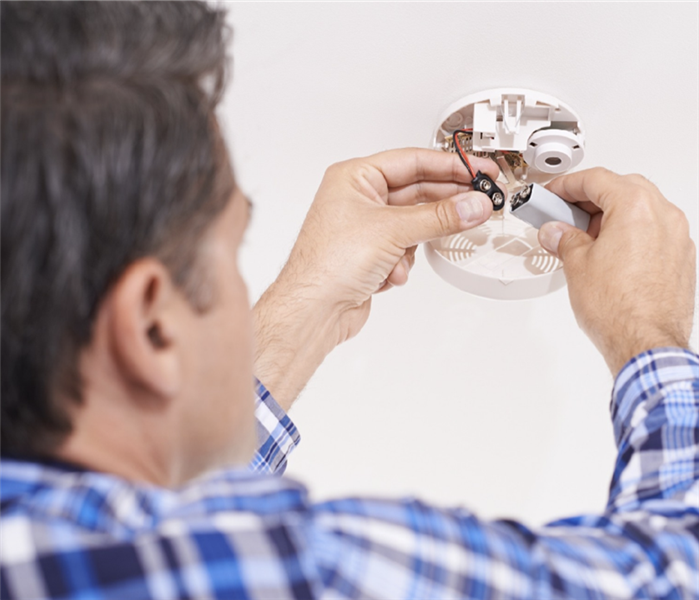 Exercise extreme caution when using power strips. Ensure that your power strip includes surge protection.
Exercise extreme caution when using power strips. Ensure that your power strip includes surge protection.
While fire safety efforts are so important for any household, there is no way to protect against
things you do not know. While there are many obvious ways a fire can start in a home, there are
also incidents that have far less obvious causes—and because it is so vital to take action
quickly once a fire starts, prevention is a much better strategy for keeping your family safe.
The National Fire Protection Association estimates that house fires cause over $7 billion in
damages annually, but many house fires can be prevented with just a few simple precautions.
Below, we will be looking at some common causes of house fires that you may not be aware of
so you can always practice good household fire safety habits.
### Common Yet Surprising Causes of Household Fires
**Overloaded outlets and power strips.** While your average power strip may have six separate
plug-in ports, depending on what you are plugging in, that may be far too much for your
electrical system to handle. Plugging in multiple appliances and heating devices at once can
overcrowd the circuit and quickly lead to an electrical fire due to sparks.
**Dryer vents clogged with lint.** Dryer lint is a byproduct of drying clothes, but it is also an
extremely dangerous substance if it is allowed to build up. If your dryer vents become
overloaded with lint, the dryer can potentially heat the lint up to extremely high temperatures
when you run your next cycle, which can start a fire.
**Objects too close to heating appliances.** Space heaters are a vital source of targeted warmth
in the winter, but they can be dangerous to use if you are not careful. While many newer models
are equipped with tipping and overheating sensors, keeping flammable objects too close to the
heater can also cause a fire to start.
**Improperly stored flammable liquids.** Many household cleaning items, paints and other
liquids are actually quite flammable if conditions are right. For example, storing things like paint
thinner or gasoline in a hot garage in the direct sun can cause a fire to break out if the
combustible material gets too hot, so be sure to read storage labels for anything of this nature.
*If you have fire damage in your home, you can count on us to handle the restoration process.
Contact us today to learn more about our fire restoration services and how we can help.*
Where to Install Smoke Alarms in Your Home | SERVPRO® of Beaver County
12/14/2021 (Permalink)
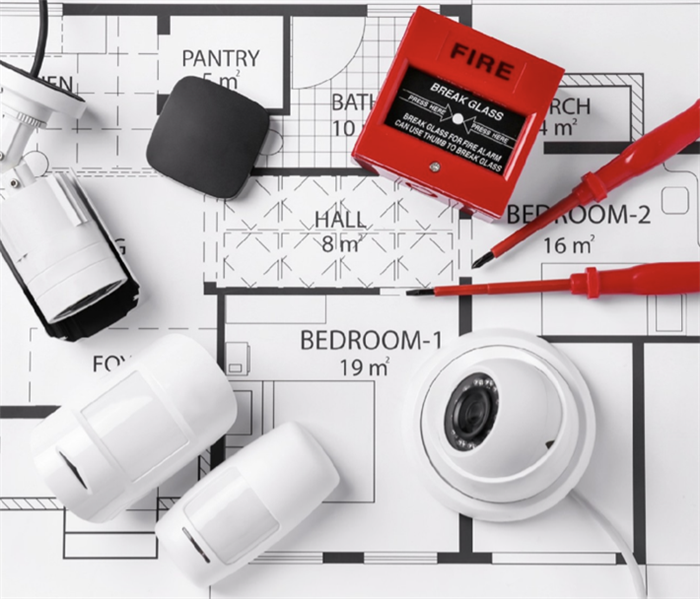 Smoke detector placement can make all the difference in the event of a fire.
Smoke detector placement can make all the difference in the event of a fire.
Having an adequate amount of smoke detectors is so important, but so is making sure that they
are placed in the right areas of the home. It is estimated that about 60% of all home fire deaths
occur due to inadequate or malfunctioned smoke alarms, but this is a tragedy that is entirely
preventable as long as you are sure to do your research.
When installing smoke alarms, it is vital to make sure they are placed in the proper areas of the
home to alert your family to a fire as soon as it begins. Because you only have about two
minutes to get out in the event of a house fire, this early alert can make all the difference in your
family’s safety.
### Where to Install Your Home’s Smoke Detectors
In some cases, there may be local building codes that differ in their smoke detector
recommendations. However, you can generally utilize the following guidance from the National
Fire Protection Association to make sure your household is covered.
Here are the places where you should be certain you are installing smoke detectors:
? Outside each sleeping area of the home and inside each individual bedroom
? On every level of the home (including the basement, if applicable)
? In the living room, dining room and any other main areas of the home
? Inside the kitchen and any other cooking areas
? Inside the garage or workshop space
### Tips for Installing Your Home’s Smoke Detectors
In addition to ensuring you are placing the smoke detectors in the right spot, it is also vital to be
certain you are placing them as effectively as possible with these helpful tips:
? Install smoke detectors at least 10 feet from cooking appliances.
? Do not place smoke detectors near windows, doors or vents that may interfere with their
detection.
? Never paint smoke alarms, as this could reduce their effectiveness.
? Install wall-mounted alarms no more than 12 inches from the ceiling.
? Place smoke alarms near stairways to upper levels if applicable.
? Interconnect all your smoke alarms if possible, so one sounding will set all the alarms in
the home off for extra safety.
? For peaked ceilings, install smoke alarms between four inches and three feet from the
apex of the peak.
*If your home has damage due to a household fire, we are the team you can count on. Get in
touch today to learn more about our fire restoration services and how we can help.*
What to Know About Choosing a Fire Extinguisher | SERVPRO® of Beaver County
10/10/2021 (Permalink)
When it comes to fire safety for your household, there are fewer things more cost-effective than getting a fire extinguisher for various rooms of the house. This small investment can be a lifesaver if a sudden fire were to break out, but it is important that you have the right tool for the job and are aware of how to use it for maximum effectiveness and safety within your home.
How to Choose a Fire Extinguisher
There are five types of fire extinguishers, and each type has a different formula that is designed to be used on certain types of fires. Making sure that you choose the right fire extinguisher for the right room is key, as the wrong fire extinguisher can make a mess without actually stopping the flames from growing. The five types of fire extinguishers are:
**Type A Fire Extinguisher**
This type of fire extinguisher is designed to be used with ordinary, organic materials such as cloth, wood and paper, and these are the most common fire extinguishers that households and businesses need.
**Type B Fire Extinguisher**
A Type B fire extinguisher is designed to be used with grease, gasoline, oil, paints and other liquids that are combustible and flammable. These are often helpful in garages and basements that store these types of products.
**Type C Fire Extinguisher**
A Type C fire extinguisher is especially designed for electronics. Appliances, tools or any other equipment that gets plugged in are prone to electrical fires, so a Type C fire extinguisher could be useful in an office area or near personal electronics.
**Type D Fire Extinguisher**
Some types of specialty metals are flammable, which is what a Type D fire extinguisher is designed to combat. These will often be found in factories and metalworking shops.
**Type K Fire Extinguisher**
Typically found in commercial kitchens, the Type K fire extinguisher is designed for use on vegetable oils, animal oils and fats that might build up and catch fire in cooking appliances.
**Multipurpose Fire Extinguishers**
Multipurpose fire extinguishers are a great solution for most households. Many of them will handle categories A, B and C, which is typically enough to meet the needs of any room in the average household.
*If you have fire damage, you can count on us for assistance. We are here 24/7 to handle any fire damage that may arise in your home or business. Contact us today to learn more.*
Understanding When and How to Use a Fire Extinguisher | SERVPRO® of Beaver County
10/10/2021 (Permalink)
If you are trying to increase the fire safety efforts in your household, purchasing fire extinguishers for any high-risk rooms is a great place to start. Fire extinguishers are an inexpensive way to take the right steps toward fire prevention, and by having them at the ready, you are reducing the chances that a small flame will turn into a major house fire.
While buying a fire extinguisher is a great first step, knowing when and how to use it is every bit as important. Using a fire extinguisher should only be done if it is safe to do so, and memorizing how to use it is key for being able to take the proper actions in the moment.
### When to Use a Fire Extinguisher
While you may think the answer is obviously, “in the event of a fire,” deciding when to use a fire extinguisher safely is actually a lot more nuanced. While putting out the fire is important, it is more important that you are keeping yourself and any others who may be present out of harm’s way.
Here are a few questions for deciding when to use a fire extinguisher:
- Is the fire contained and only impacting a small area?
- Have I alerted others that a fire has started?
- Do I know how to properly use the fire extinguisher?
- Is someone in the process of calling the fire department?
- Do I have enough fresh air, or is there toxic smoke from the fire?
- If I cannot extinguish the fire, do I have an escape route?
If you are able to answer “yes” to all of these questions, then it should be safe to proceed to using the fire extinguisher. However, if you are not, it is best to simply escape and call the fire department so they can handle the flames.
How to Use a Fire Extinguisher
If you need to use a fire extinguisher, remember the P.A.S.S. method:
- Pull the pin at the top.
- Aim the extinguisher at the base of the fire, not at the flames.
- Squeeze the handle to release the contents.
- Sweep the extinguisher from side to side until all flames are gone.
*If you have damage due to a fire in your home, you can count on us for restoration. You can call us 24/7 to report damage or to hear more about our services. Contact us today!*
Important Things to Note About Your Home’s Smoke Alarms | SERVPRO® of Beaver County
10/10/2021 (Permalink)
Smoke detectors are an absolutely essential safety feature of any home or outbuilding—the phrase, “smoke detectors save lives,” is one that certainly rings true. However, smoke detectors are not something you can set up and forget until you need them.
Properly maintaining and testing your home’s smoke alarms is an important part of ensuring they will work in the event of an emergency.
Fortunately, proper smoke detector maintenance does not take much time and can be easily added to your seasonal home maintenance task list with ease. Just a few minutes every month can provide you with priceless peace of mind and keep you and your family safer in the event of a fire.
### How to Maintain Your Smoke Alarms
**Check them every single month.** In a quarter of household fires where smoke detectors failed, dead batteries were to blame—which is a very preventable tragedy. Every 30 days, be sure to use the test button on each smoke detector in your home to ensure that it is working as it should, and if yours are equipped to notify you about a low battery, be sure you change them out promptly.
**Replace them every 10 years.** Even if your smoke alarms seem to be working during your monthly tests, they should still be replaced every 10 years according to the National Fire Protection Association. Because their internal components can wear down with time, they can become less effective at detecting smoke in the home and may not notify your family with enough time to spare.
**Be sure you have plenty of them.** Do an assessment of how many smoke alarms you have in your home and where they are located to see if you need more. You should have smoke alarms inside every bedroom, outside each sleeping area, on every level of the home and in the kitchen, garage and basement.
**Have a plan in case they sound.** If a smoke alarm sounds, it is vital that you and your family know what to do. Making sure you have a proper evacuation plan in place is key to getting everyone out quickly so you can stay safe and await the fire department’s response.
*If you have household fire damage, you can count on us to help. Get in touch today to learn more about our fire restoration services and how we can help.*
Our Teams Are Ready to Help You When Minutes Matter Most | SERVPRO® of Beaver County
2/16/2021 (Permalink)
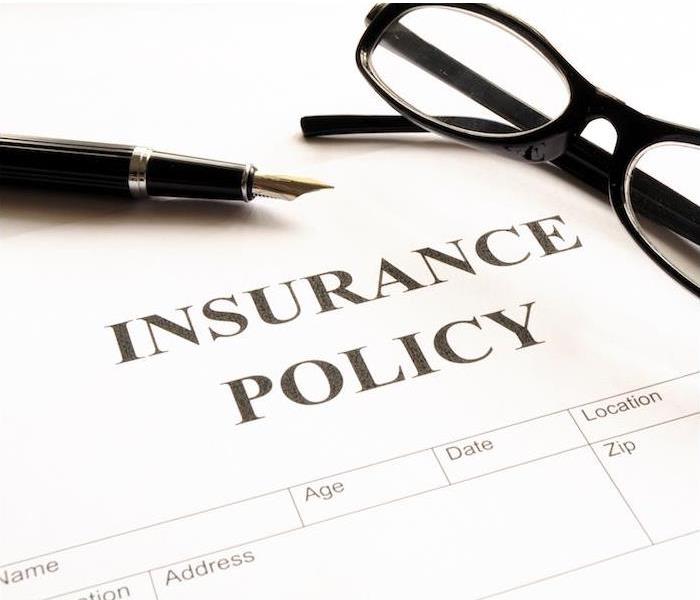 If your home is damaged due to a disaster, contact SERVPRO of Beaver County. From start to finish, we will be here to help.
If your home is damaged due to a disaster, contact SERVPRO of Beaver County. From start to finish, we will be here to help.
We help a lot of homeowners in our area every year. Did you know that every home we restore and repair has one thing in common?
It’s not what you would think. It’s timing. The sooner we start the restoration process, the easier it is for our teams to get your home back to its original state.
The timing makes a difference because damage can spread quickly. For example, if your home suffers from water damage, you can usually begin to notice the signs of that damage within hours or days. The signs of mold and wood warping are among the first things homeowners notice.
Starting earlier makes it easier for us to repair these issues.
Why Homeowners Will Need Us in 2021
Here’s a closer look at why people call us for restoration services. They include severe weather issues, such as wind, hail and rain. Accidents and appliance malfunctions also cause severe damage to homes.
No matter what type of restoration service you need, it’s smart to choose a partner that will start the repairs promptly and ensure the process goes as smoothly as possible.
Understanding the SERVPRO Difference
We’re here to get the process started as soon as you need our help. That means you can call us at any time. We’re here 24⁄7to help you, so if you reach out, we’ll answer your questions and help you start the process.
There are other good reasons to choose SERVPRO, too. Here’s what makes us different:
The technicians you’ll meet are highly skilled in their field. Our teams are staffed by experts. They hold high-level certifications in their fields. So that means they will bring their wealth of knowledge about water damage to your home.
Our technicians use the latest and greatest restoration equipment on the market. We’re a locally owned business, but we’re affiliated with SERVPRO. That means we have access to the technology that comes with a large national brand. We’ll bring that leading-edge technology to your home.
If your home is damaged due to fire, water or any other cause, you can always count on us for restoration assistance. We have teams who are available 24⁄7 in the event of an emergency. Contact us at any time to learn more about our restoration services and how we can help your family.
Our Fire Restoration Process
8/26/2020 (Permalink)
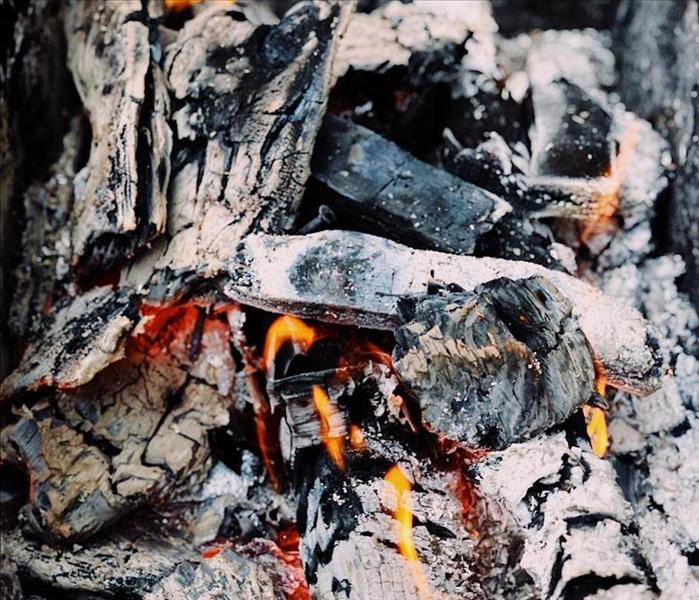 We take restoring your home seriously.
We take restoring your home seriously.
Having a fire in your home, big or small can still be an overwhelming experience. At SERVPRO of Beaver County we take the worry out of restoration. We have a dialed in process for all fire damages that make the transition seamless for you, your family, and your home. It all starts upon contact. Once you reach out to us, we will come out to your property to assess the damage, from there we secure the property with any tarps or board ups to stop any further damage from the outside elements. Then we get to work on removing any water damage, smoke, or soot. Finally, we work to clean and restore your property to its previous condition. Read the steps in detail below!
Step 1: Emergency Contact
The restoration process begins when you call us. Our representative will ask questions regarding the fire damage event that will help us respond immediately with the appropriate equipment and resources. Step 2: Inspection and Fire Damage Assessment
We carefully inspect and test adjoining rooms of your property to determine the extent of the fire, smoke, and soot damage. This step is crucial to developing a plan of action. Step 3: Immediate Board-Up and Roof-Tarp Service
Fire damage can often compromise windows, walls, and roofs. To maintain security and to protect against further damage, we can board up missing windows and walls and place tarps on damaged roofs. Step 4: Water Removal and Drying (if water damage is present)
The water removal process begins almost immediately and removes the majority of the water. We then use dehumidifiers and air movers to remove the remaining water and complete the drying process. Step 5: Removal of Smoke and Soot from All Surfaces
We use specialized equipment and techniques to remove smoke and soot from ceilings, walls, and other surfaces. Step 6: Cleaning and Sanitizing
We clean, sanitize, and disinfect all of the restorable items and structures that were damaged by the fire. We use a variety of cleaning techniques to restore your belongings to pre-fire condition. We’re also trained to remove odors using industrial air scrubbers and fogging equipment.Step 7: Restoration
Restoration is the final step—getting your home or business to its pre-fire condition. Restoration may involve minor repairs, such as replacing drywall, painting, and installing new carpet; or it may entail major repairs such as the reconstruction of various areas or rooms in a home or business. Call us today for all of your fire restoration needs at 724-709-7235.
Restoring Your Fire Damaged Items
7/29/2020 (Permalink)
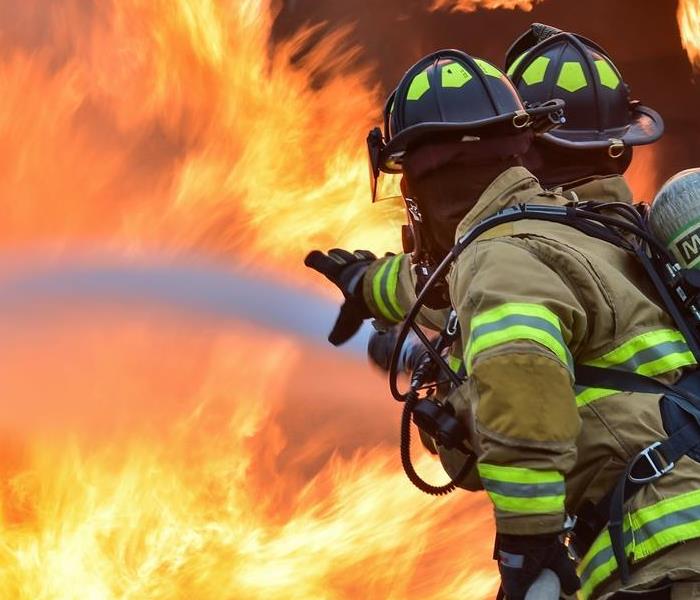 SERVPRO of Beaver County specializes in restoring, not replacing.
SERVPRO of Beaver County specializes in restoring, not replacing.
A fire doesn’t have to be large to do some serious damage to your home or belongings. In most cases, even if the integrity of the home isn’t compromised, your furniture, carpets, etc. can all have lasting effects from the smoke and fire. That’s why SERVPRO of Beaver County specializes in restoring contents damaged by fire. We know how important your belongings are and we do our best to “restore” versus “replace so that you can save money and more importantly, save irreplaceable keepsakes. We immediately assess the area with your belongings and run through what can and cannot be restored. We specialize in the SERVPRO Clean with many different tactics for all types of belongings. We use several methods of cleaning your contents, including:
- Dry Cleaning - Used for cleaning light residues or to pre-clean prior to wet cleaning.
- Wet Cleaning - An effective cleaning method for removing moderate to heavy residues.
- Spray and Wipe - Effective for items that can’t withstand wet cleaning.
- Foam Cleaning - Used for upholstery fabrics that might shrink or bleed if wet cleaned.
- Abrasive Cleaning - Involves agitation of the surface being cleaned.
- Immersion Cleaning - Contents are dipped into a bath of the cleaning product.
When you have a major fire disaster, the last thing you want to think about is loss. It’s our mission to restore your items back to pre-fire condition. Call us today at 724-709-7235 for all of your cleaning and fire restoration needs.
Kitchen Fire and Smoke Remediation
5/15/2020 (Permalink)
Some say the kitchen is the heart of the home, but it can also be the start of many home fire disasters. Sometimes preventing a fire in your home or business is just not possible and the inevitable happens.
A fire to your home can be devastating, especially if it impacts the rest of your home. Even if your home or business is not damaged beyond recognition, the smoke that has occurred from the fire can cause just as much damage.
The smoke damage from this kitchen fire in Beaver County damaged the interior (bathroom, bedroom, closets, etc.) and even damaged the food in the kitchen. We worked the eradicate the cause of the loss and the remaining smoke damage.
We were able to remediate the smoke and fire damage.
For home and office fire remediation, call us at (724) 709-7235.
The details on Soot and Smoke
12/18/2019 (Permalink)
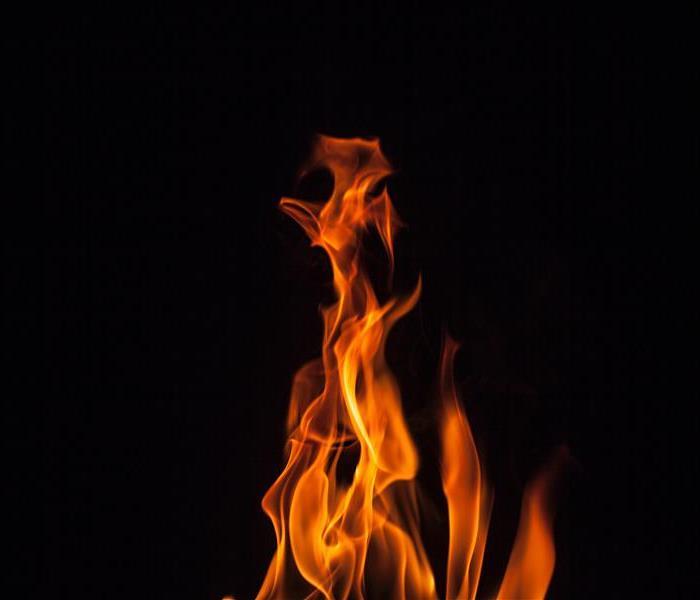 Call us to clear the air on soot and smoke damage.
Call us to clear the air on soot and smoke damage.
Smoke and soot is very invasive and can penetrate various cavities within your home, causing extensive hidden damage and odor. Our smoke damage expertise and experience allows us to inspect and accurately assess the extent of the damage to develop a comprehensive plan of action.
Smoke and soot facts:
•Hot smoke migrates to cooler areas and upper levels of a structure.
•Smoke flows around plumbing systems, seeping through the holes used by pipes to go from floor to floor.
•The type of smoke may greatly affect the restoration process.
Different Types of Smoke
Smoke is broken down into two areas, which are smoke wet and dry. Because of this, there are different types of soot residue after a fire. Before the restoration process, SERVPRO of West Beaver County will test the soot and determine which type of smoke damage has occurred. Our plan of action is based on the information we obtain during pretesting. Here is some additional information:
Wet Smoke – Plastic and Rubber
•Low heat, smoldering, pungent odor, sticky, smeary. Smoke webs are more difficult to clean.
Dry Smoke – Paper and Wood
•Fast burning, high temperatures, heat rises therefore smoke rises.
Protein Fire Residue – Produced by evaporation of material rather than from a fire
•Virtually invisible, discolors paints and varnishes, extreme pungent odor.
Our Fire Damage Restoration Services
Since each smoke and fire damage situation is different, each one requires a unique solution tailored for the specific conditions. We have the equipment, expertise, and experience to restore your fire and smoke damage. We will also treat your family with empathy and respect and your property with care.
Have Questions about Fire, Smoke, or Soot Damage?
Call Us Today – (724) 709-7235
Fireplace Tips and Tricks
9/18/2019 (Permalink)
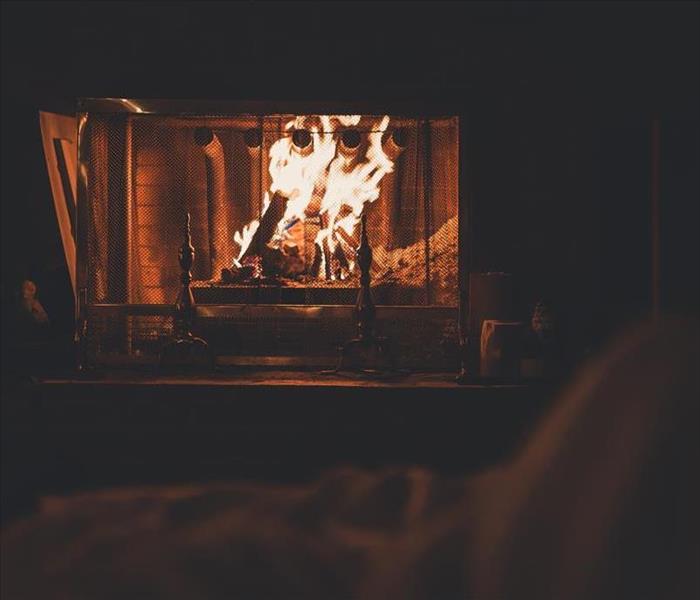 Make sure your fireplace is safe.
Make sure your fireplace is safe.
Knowing the ins and outs of your fireplace can help in a quick pinch. Here are some tips to keep your fireplace safe for you and your property.
- Making sure your chimney is cleaned before the season will help greatly. Soot residue can start hidden fires that can fester in your chimney.
- Using a fireplace screen will help prevent burnt logs from rolling out of your fireplace that can quickly start fires and burn carpet.
- Don’t use any other wood except for wood specifically for fires. Using painted wood or treated lumber can let in toxic fumes that can be harmful to you and your family.
- It’s best to have a class c extinguisher on hand in case of any fire emergencies.
No matter the fire, we are here for you. Please refer to our Fire Damage Tips - Until Help Arrives Guide and follow these tips to protect yourself and your property.
Summer Grill Safety
8/13/2019 (Permalink)
 Grills are a fun way to spend your summer time, but making sure you are safe is critical.
Grills are a fun way to spend your summer time, but making sure you are safe is critical.
It may seem like the dog days are dwindling, but summer isn’t over yet. That means pool parties, vacation, and grilling on the deck, but are you making sure you are using your grill in the safest way possible? We have some great tips for keeping your home and family safe during grilling season.
- Make sure to not leave your grill unattended when it is lit.
- Clean your grill after every use. Old grease and residue can be a quick way to start an unwanted fire.
- 3 feet rule. Keep your grill 3 feet away from your property or other objects that can be on your deck or patio (chairs, tables, etc.) Make sure you look for overhead tree branches that can catch fire.
- If you’re using a charcoal grill, dispose of coals in a metal can once they have cooled.
- If using a gas grill, open the grill before you light it. If the flame goes out, turn your grill off and wait 5 minutes before you relight.
- Have baking soda or a class c fire extinguisher on hand in case of a fire that gets out of hand.
No matter the fire, we are here for you. Please refer to our Fire Damage Tips - Until Help Arrives Guide and follow these tips to protect yourself and your property.
Electrical Fires - What you need to know
7/24/2019 (Permalink)
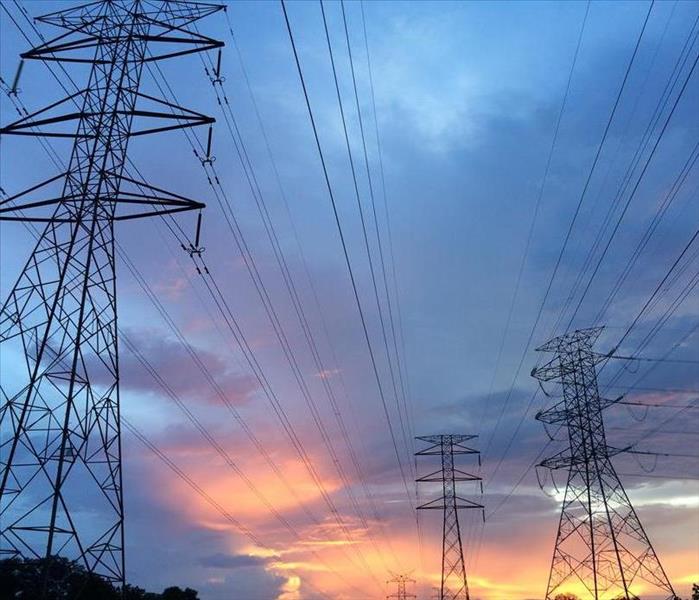 Electrical Fires can be extremely damaging
Electrical Fires can be extremely damaging
Fireplaces and furnaces aren’t the only things that you need to worry about for fire disasters. While those are more common in the winter, electrical fires can happen during any season at any time.
What can cause an electrical fire?
Any electrical appliance. Lighting, Extension Cords, Outlets, Appliances, and Heat generating equipment are all at risk of electrical fires.
Preventative Measures that can help
Keep an eye out for product recalls on appliances and electrical wiring. A simple search on recalls.gov will give you a quick answer.
Product recalls happen, but so do counterfeit products. Counterfeit products land on store shelves more than you think and they are made cheaply and have a higher risk of malfunctioning. You can refer to the Consumer Product Safety Commission for a list of items.
DO NOT plug appliances into extension cords. Plug appliances straight into the wall for appropriate operation.
Any appliance that generates heat will use more electricity. Try not to plug heat related items into one circuit. This includes hair dryers, space heaters, etc.
If you home was built before 1990, you will want to check and make sure your wiring is not old and out of date. With such an advancement of technology, some homes aren’t equipped for the amount of high technology electricity that we use on a daily basis.
What to do
DO NOT try and use water to eliminate the electrical fire. This will out you at risk for electrocution. Having a fire extinguisher on hand is the best way to counter and electrical fire.
To reduce the most risk, it is best to turn of the electric (if possible and safe), leave the home, and call 911.
Firework Safety during the Holidays
7/3/2019 (Permalink)
 Practice safe firework practices during the Fourth of July!
Practice safe firework practices during the Fourth of July!
The 4th of July is a time for celebrating America with family and friends. With fun colors and zips and zaps, fireworks are a staple of the celebration. However, proper precautions have to be made in order to have a safe and fun fourth of July. Use these tips for firework safety!
- Make sure to have a first aid kit or safety kit on hand.
- Have a hose or bucket of water to spray on fireworks that have been used.
- Rogue fireworks can cause major fire damage if they get out of hand. Have a fire-retardant blanket or fire extinguisher on hand to prevent a fire disaster.
- Have a parent or guardian supervising.
- Always light fireworks outside, never inside.
If you do suffer from fire damage due to fireworks, read our fire safety tips here, and contact us at (724) 709- 7235.
Fire Safety and Prevention in the Kitchen
5/16/2019 (Permalink)
 Make sure to keep towels and other items away from an open flame!
Make sure to keep towels and other items away from an open flame!
Some say the kitchen is the heart of the home, but it can also be the start of many home fire disasters. Here are some basic how-to's on how to prevent small kitchen fires from turning into major disasters.
Stopping Before it Starts:
- Keep hand towels/ pot holders, shopping bags, aprons, or other flammable objects away from the stovetop. It’s also good to not wear loose clothing or long sleeves and to tie long hair back.
- Never leave the kitchen while cooking. Water and other items boil down faster than you think!
- Make sure to check old electric grills or other electric appliances for exposed wires. You are just as much at risk for electrical fires in the kitchen as you are from an open flame.
I have a fire! What now?
Small items around your kitchen can help put out small fires before a disaster occurs.
- If grease and oil catch fire on your stove DO NOT use water to extinguish. Water only increases the spread of grease fires. Use baking soda to spread on the small fire until it has been put out.
- DO NOT use a towel to try and dissipate the flame. Oxygen and air will only fuel the fire. Instead, use a pot lid over the flame for a make shift snuffer.
- Use a class-c fire extinguisher over the affected area.
These small efforts in the kitchen can help prevent a fire disaster in your home. If you believe a fire is out of your hands, never take a risk and always call the appropriate authorities.
SERVPRO of West Beaver County will be there when disaster strikes. Take a look at some of our before and after’s that we have done on fire damage.
5 Tips to Help Prevent a Fire in Your Home
1/21/2019 (Permalink)
Dealing with the aftermath of a fire in your home or business can be costly, time-consuming and emotional. Therefore it’s important to take certain precautions to prevent or decrease the likelihood of a fire. These helpful tips provided by the NPFA can reduce the probability of a fire in your home or office;
- Watch your cooking! You should always stay in the kitchen when you are frying, grilling or broiling food. Remember to never let young children near the stove or oven while you are cooking.
- Give space heaters space! It’s best to keep space heaters at least 3 feet away from anything that can burn.
- Keep matches and lighters out of reach! The safest place to keep matches and lighters is in high cabinets, preferably under a child lock.
- Inspect electrical cords! You should replace cords that are cracked, damaged, have broken plugs, or loose connections.
- Be careful when using candles! Be sure to keep candles at least one foot away from anything that will burn.
Not all fires are caused by things we have control over. Some fires can be caused by unavoidable acts of nature or unpredictable accidents. Just in case one of these catastrophes may happen, keep in mind that a fire escape plan for your family or crew is always a good idea! Try practicing it at least twice a year. In the event of fire damages SERVPRO of West Beaver is available around the clock to offer exceptional response time and trained professionals ready to restore your property!





 24/7 Emergency Service
24/7 Emergency Service
















